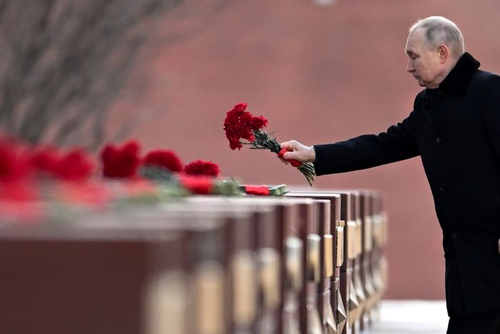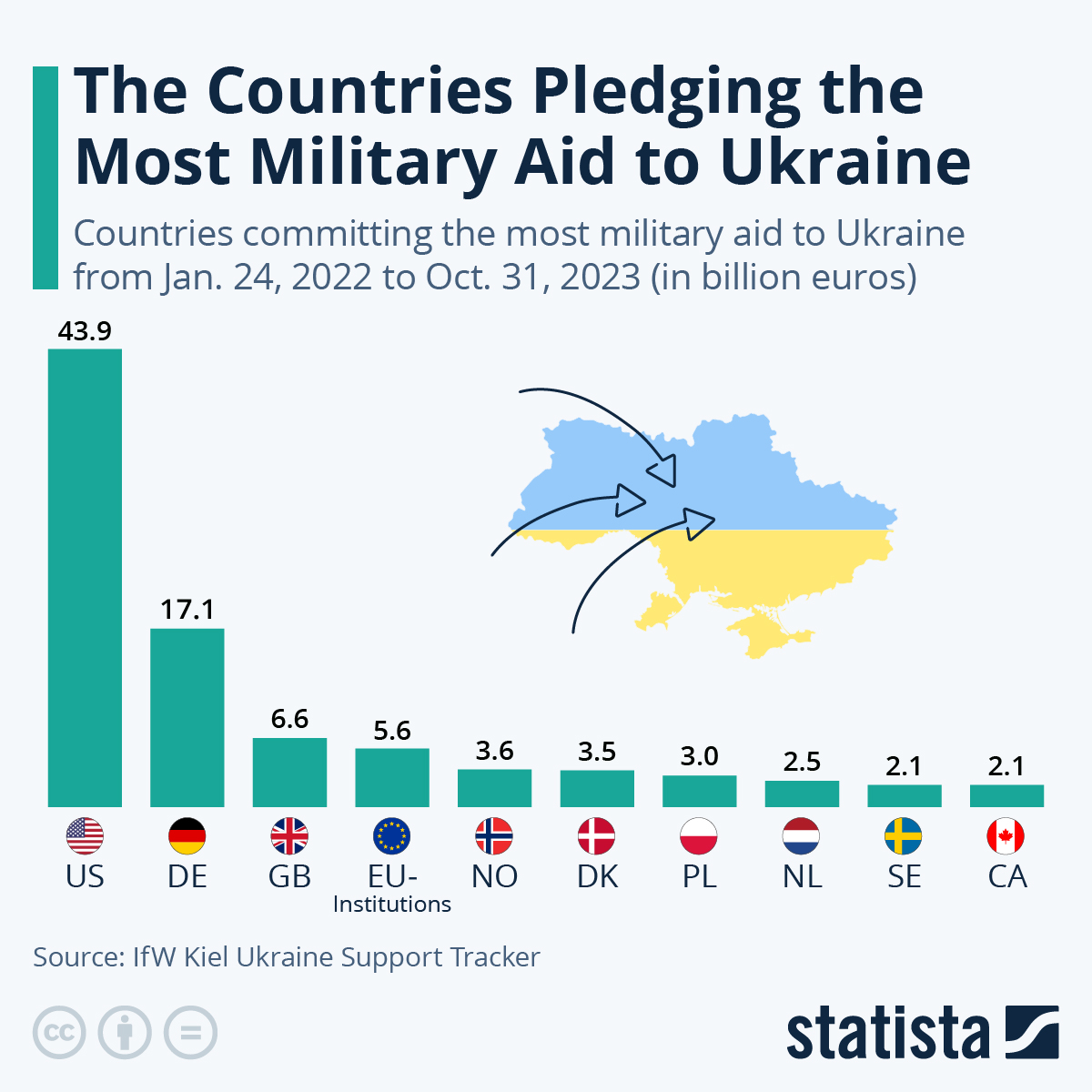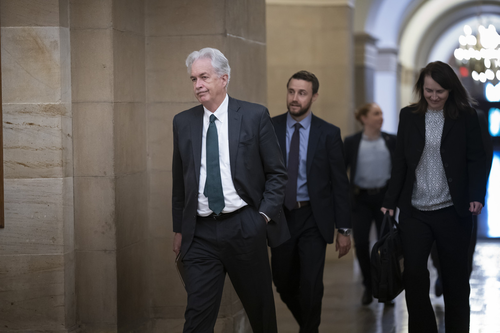Authored Joe Lauria via ConsortiumNews.com,
Western leaders privately told Ukrainian President Volodymyr Zelensky that Ukraine can not win the war against Russia and that it should begin peace talks with Moscow this year in exchange for closer ties with NATO.
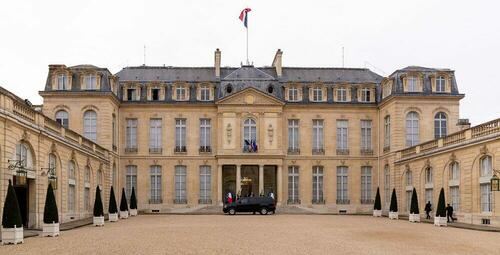
Élysée Palace where Macron and Scholz told Zelensky to seek peace. (U.S. State Dept.)
The private communications are at odds with public statements from Western leaders who routinely say they will continue to support Ukraine for as long as it takes until it achieves victory on the battlefield.
The Wall Street Journal, which reported on the private remarks to Zelenksy, said:
“The public rhetoric masks deepening private doubts among politicians in the U.K., France and Germany that Ukraine will be able to expel the Russians from eastern Ukraine and Crimea, which Russia has controlled since 2014, and a belief that the West can only help sustain the war effort for so long, especially if the conflict settles into a stalemate, officials from the three countries say.
‘We keep repeating that Russia mustn’t win, but what does that mean? If the war goes on for long enough with this intensity, Ukraine’s losses will become unbearable,’ a senior French official said.
‘And no one believes they will be able to retrieve Crimea.’
French President Emmanuel Macron and German Chancellor Olaf Scholz told Zelensky at an Élysée Palace dinner earlier this month that he must consider peace talks with Moscow, the Journal reported.
According to its source, the newspaper quoted Macron as telling Zelensky that “even mortal enemies like France and Germany had to make peace after World War II.”
Macron told Zelensky “he had been a great war leader, but that he would eventually have to shift into political statesmanship and make difficult decisions,” the newspaper reported.
A Return to Realism
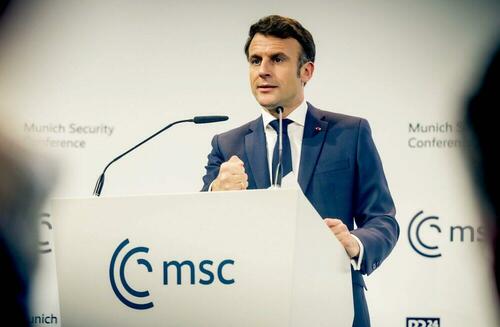
Macron at the Munich Security Conference last week. (Kuhlmann/MSC)
At the Munich Security Conference last week, Gen. Petr Pavel, the Czech Republic’s president-elect and a former NATO commander, said:
“We may end up in a situation where liberating some parts of Ukrainian territory may deliver more loss of lives than will be bearable by society. … There might be a point when Ukrainians can start thinking about another outcome.”
Even when he was a NATO commander Pavel was a realist in regard to Russia. During controversial NATO war games with 31,000 troops on Russia’s borders in 2016 — the first time in 75 years that German troops had retraced the steps of the Nazi invasion of the Soviet Union — Pavel dismissed hype about a Russian threat to NATO.
Pavel, who was chairman of NATO’s military committee at the time, told a Brussels press conference that, “It is not the aim of NATO to create a military barrier against broad-scale Russian aggression, because such aggression is not on the agenda and no intelligence assessment suggests such a thing.”
The German foreign minister at the time, Frank-Walter Steinmeier, also embraced realism towards Russia, saying: “What we shouldn’t do now is inflame the situation further through saber-rattling and warmongering. Whoever believes that a symbolic tank parade on the alliance’s eastern border will bring security is mistaken.”
Instead of an aggressive NATO stance towards Russia that could backfire, Steinmeier called for dialogue with Moscow. “We are well-advised to not create pretexts to renew an old confrontation,” he said, saying it would be “fatal to search only for military solutions and a policy of deterrence.” Under U.S. leadership NATO clearly did not follow that advice, as it continued to deploy more troops to Eastern Europe and to arm and train Ukraine (under cover of pretending to back the Minsk Accords).
Before its intervention in Ukraine, Russia cited NATO’s eastward expansion, the deployment of missiles in Romania and Poland, war games near its borders and the arming of Ukraine as red lines that the West had crossed.
After a year of war, Western leaders appear now to be turning to a realist approach. Macron, for instance, at the Munich Security Conference dismissed any talk of regime change in Moscow.
No US Reaction
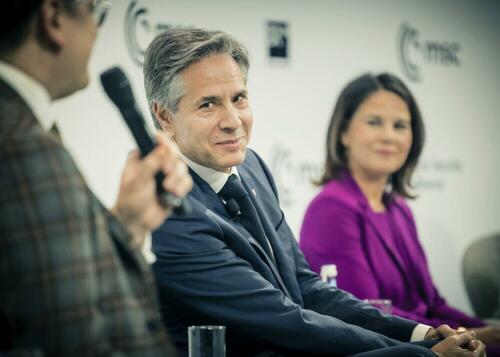
Left to Right: Ukrainian Foreign Minister Dmytro Kuleba, U.S. Secretary of State Antony Blinken and German Foreign Minister Annalena Baerbock at Munich Security Conference. (Schulmann/MSC)
Washington has not commented on the Journal‘s story about the peace talks-for-arms proposal.
U.S. Secretary of State Antony Blinken last month discussed with The Washington Post arming Ukraine post-war but he did not say that Ukraine should seek peace talks.
“We have to be thinking — and we are — about what the postwar future looks like to ensure that we have security and stability for Ukrainians and security and stability in Europe,” Blinken told the conference in Munich.
The proposal to bring Ukraine even closer to NATO than it already is, with greater access to weapons after the war, should be on the agenda at NATO’s annual meeting in July, said Rishi Sunak, the British prime minister, at the Munich conference.
“The NATO summit must produce a clear offer to Ukraine, also to give Zelensky a political win that he can present at home as an incentive for negotiations,” a British official told the Journal.
The deal with NATO would not include membership with its Article 5 protection, the newspaper reported. “We would like to have security guarantees on the path to NATO,” Zelensky told a press conference on Friday.
In the meantime, Macron, according to the WSJ report, said that Ukraine should press forward with a military offensive to regain territory in order to push Moscow to the peace table.
There has been no reaction from Moscow about the proposal. Political analyst Alexander Mercouris, in his video report on Saturday, said Russia would likely be incentivized to continue fighting rather than enter peace talks with the knowledge that Ukraine would be heavily armed by NATO after the war.
“The Russians are never going to agree with something like this,” Mercouris said.
“They must be saying to themselves that instead of agreeing to this plan, it actually makes more sense … to continue this war because one of [Russia’s] objectives is the total demilitarization of Ukraine.”
What the Western powers are proposing is the opposite, he said. Given that Russia considers it is winning and “there seems to be a general acknowledgment amongst Western governments that Ukraine can’t win this war, …where is the incentive for … Russia to even consider this plan?”
For Moscow, Mercouris said, Ukraine’s demilitarization is an “absolute, existential matter.”
If Ukraine is going to get even more advanced weapons from NATO after the war as opposed to what it would get “whilst the war is still underway, then it makes even less sense” for Russia “to stop the war and agree to this plan.”
Russia is facing a “weakening adversary now,” Mercouris said, and Moscow clearly prefers that to facing a “strengthened adversary later.”
